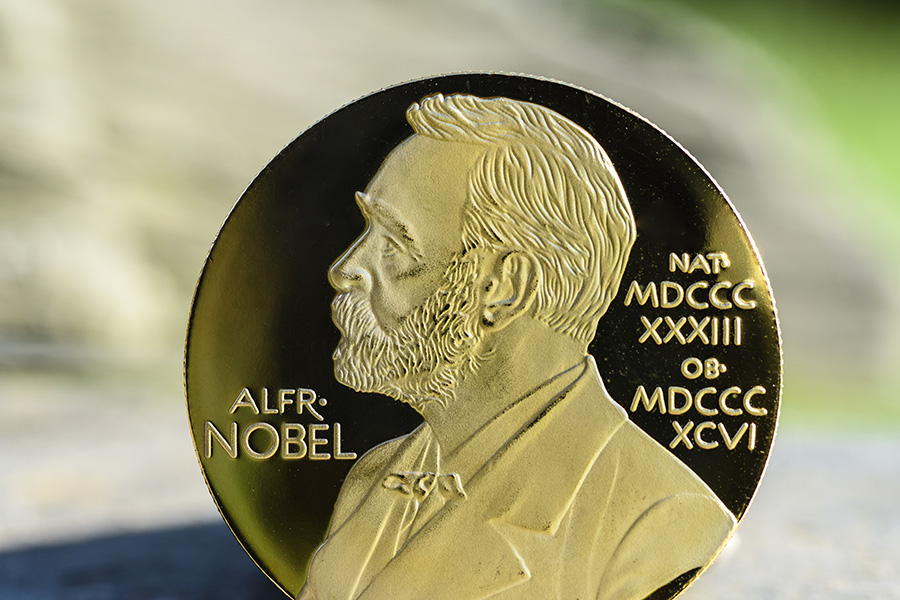A Legacy of Laureates
Since its founding, Carnegie Mellon has been home to 21 Nobel Prize recipients. The Nobel Prizes, first awarded in 1921, recognize individuals who “have conferred the greatest benefit to humankind” in one of six categories: physics, chemistry, physiology or medicine, literature, peace and economic sciences.
The Nobel Prizes are widely regarded as the most prestigious awards given in each respective field. Tartans have received awards in five of the six prize categories.
Nobel Prize in Chemistry
- Paul Flory – Mellon Institute Former Researcher*. Awarded in 1974 "for his fundamental achievements, both theoretical and experimental, in the physical chemistry of the macromolecules."
- Walter Kohn – Mellon College of Science Former Faculty*. Awarded in 1998 (with John Pople) “for his development of the density-functional theory.”
- John A. Pople – Mellon College of Science Former Faculty*. Awarded in 1998 (with Walter Kohn) “for his development of computational methods in quantum chemistry.”
- Ada E. Yonath – Mellon College of Science Post-Doctoral Fellow, 1969. Awarded in 2009 (with Venkatraman Ramakrishnan and Thomas A. Steitz) “for studies of the structure and function of the ribosome.”
Nobel Peace Prize
- Edward Rubin – College of Engineering Faculty. Awarded in 2007 (with other members of the Intergovernmental Panel on Climate Change) “for their efforts to build up and disseminate greater knowledge about man-made climate change, and to lay the foundations for the measures that are needed to counteract such change.”
Sveriges Riksbank Prize in Economic Sciences in Memory of Alfred Nobel
- Lars Peter Hansen – Tepper School of Business Former Faculty. Awarded in 2013 (with Eugene F. Fama and Robert J. Shiller) “for their empirical analysis of asset prices.”
- Finn E. Kydland – Tepper School of Business Faculty, 1972, 1973. Awarded in 2004 (with Edward C. Prescott) “for their contributions to dynamic macroeconomics: the time consistency of economic policy and the driving forces behind business cycles.”
- Robert E. Lucas Jr. – Tepper School of Business Former Faculty. Awarded in 1995 “for having developed and applied the hypothesis of rational expectations, and thereby having transformed macroeconomic analysis and deepened our understanding of economic policy.”
- Merton H. Miller – Tepper School of Business Former Faculty*. Awarded in 1990 (with Harry M. Markowitz and William F. Sharpe) “for their pioneering work in the theory of financial economics.”
- Franco Modigliani – Tepper School of Business Former Faculty*. Awarded in 1985 “for his pioneering analyses of saving and of financial markets.”
- Dale T. Mortensen – Tepper School of Business, 1967*. Awarded in 2010 (with Peter A. Diamond and Christopher A. Pissarides) “for their analysis of markets with search frictions.”
- John F. Nash Jr. – Mellon College of Science, 1948*. Awarded in 1994 (with John C. Harsanyi and Reinhard Selten) “for their pioneering analysis of equilibria in the theory of non-cooperative games.”
- Edward C. Prescott – Tepper School of Business Former Faculty, 1967. Awarded in 2004 (with Finn E. Kydland) “for their contributions to dynamic macroeconomics: the time consistency of economic policy and the driving forces behind business cycles.”
- Herbert Simon – Dietrich College of Humanities and Social Sciences/School of Computer Science/Tepper School of Business Former Faculty*. Awarded in 1978 “for his pioneering research into the decision-making process within economic organizations.”
- Oliver E. Williamson – Tepper School of Business, 1962, 1963. Awarded in 2009 (with Elinor Ostrom) “for his analysis of economic governance, especially the boundaries of the firm.”
Nobel Prize in Physiology or Medicine
- Paul Lauterbur – Mellon Institute Former Researcher*. Awarded in 2003 (with Sir Peter Mansfield) “for their discoveries concerning magnetic resonance imaging.”
Nobel Prize in Physics
- Clinton J. Davisson – College of Engineering Former Faculty*. Awarded in 1937 (with George P. Thomson) “for their experimental discovery of the diffraction of electrons by crystals.”
- John L. Hall – College of Engineering, 1956, 1961. Awarded in 2005 (with Roy J. Glauber and Theodor W. Hänsch) “for their contributions to the development of laser-based precision spectroscopy, including the optical frequency comb technique.”
- Geoffrey E. Hinton – School of Computer Science Former Faculty. Awarded in 2024 (with John J. Hopfield) “for foundational discoveries and inventions that enable machine learning with artificial neural networks.”
- Clifford G. Shull – Mellon College of Science, 1937*. Awarded in 1994 (with Bertram N. Brockhouse) “for the development of the neutron diffraction technique.”
- Otto Stern – Mellon College of Science Former Faculty*. Awarded in 1943 “for his contribution to the development of the molecular ray method and his discovery of the magnetic moment of the proton.”
